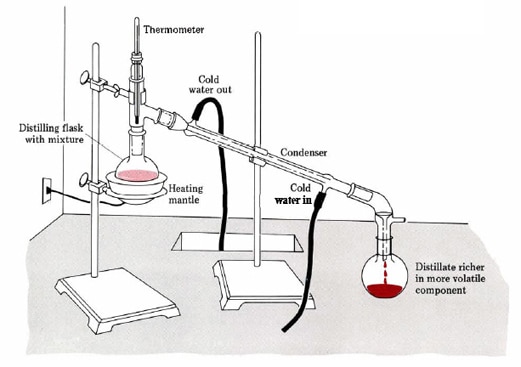The most frequent question I get these days is, “is there gluten in gin?”
No, there is no gluten in gin.
For a TL;DR you could stop reading now. But if you still think that because there’s Red Winter Wheat in your gin, that it has gluten in it, please read on.
The Celiac Disease Foundation states clearly, “distilled products do not contain any harmful gluten peptides even if they are made from gluten-containing grains. Research indicates that the gluten peptide is too large to carry over in the distillation process, leaving the resulting liquid gluten-free.” [source]
How does distillation remove gluten?

During distillation, the flask on the left is heated until the liquid begins to turn into steam. The steam then passes through a chilled tube called a condenser. The condenser turns the steam back into a liquid.
In short, are you afraid of gaseous gluten?
No, because gluten is not volatile. It cannot be evaporated. Therefore gluten cannot possibly end up in the liquid on the right hand side. The gluten proteins cannot be turned into a gas. In fact, the very act of heating them can denature/destroy the proteins. But more often in distillation it’s left in one side of the still, and not the side that’s turned into gin.
What happens to the grain in gin?
The grain is part of the stuff on the left. Distillers let bacteria eat the grain before it enters in the still. In doing so, they release ethanol as waste. That is what all spirits begins as.
The distillers puts all this grain into the still. They heat it to the point where ethanol (and water) evaporate. That’s what ends up turning into liquid at the end.
When the distillation is done and the ethanol removed, many distillers give the used grain to farms where it can be used to feed pigs.
How come I can taste grain in gin?
Again, what you taste is what has been evaporated and re-condensed back into a liquid phase. What you taste are aromatic molecules which were present in the original grain. Unlike gluten, these aromatic molecules do boil.
If you miss the flavor of a grain, gin is safe place to taste that flavor with all of the gluten gone.
But I still feel sick.
This may surprise you, but alcohol is a stomach irritant.
In other words, even people who can eat gluten can feel this way when drinking.
I’m confused— but is there gluten in gin?
No, there is no gluten in gin. And there’s absolutely no debate or discussion about it. It’s fairly straight forward. The Celiac Disease Foundation finds the issue pretty cut and dry.
But it’s easy to see why you’re confused. There’s a ton of uneducated people who don’t understand how distillation or gluten works telling you things that are not true. This misinformation is everywhere, and it often goes unchallenged.
Being gluten-free is hard. I know, I started out as beer nerd over ten years ago. But I had to give it up. Because I too can’t process gluten. In the last ten years, I’ve reviewed a ton of gins made from wheat, several gins distilled from barley, distilled from rye.
I’m gluten-free too. Not by choice. But I’ve chosen gin. There is no gluten in gin. I hope you too will choose gin.

Thank you.
Thank you for the explaination.
This is a nicely written article that I will refer to some of our clients who use BDAS, LLC. Many insist on getting a test done when it may – as you state – not be necessary and is quite a costly test. However, those infusing vodka to make their own gin might be adding items to which they could be allergic – so that is something to think about. We will also convey this to our attendees in our gin courses.
Thank you for this article. You have explained the processes really clearly. I have recently had to go gluten-free and am finding it quite depressing at times, so the knowledge that I don’t have to give up gin too is an enormous relief!
Thank you for the important article. One correction, if I may: I believe distillers use (uniformly) yeast to eat the grain to convert the sugars to alcohol. Yeast is not a bacterium, but rather, a type of fungus.
I have a gluten allergy. I drink all kinds of alcohol but I if it is distilled from Barley, Wheat or Rye I get very sick. My heart starts racing and I vomit. This is the same reaction I have when eating gluten.
I just thought I would share my experience. You may not agree but my body disagrees with this article.
I’m sorry to hear about your experiences. Alcohol is, technically speaking, a poison and has an adverse affects on a person’s body (which is especially relevant, when to those with Celiac Disease or other kinds of gluten sensitivity, to them gluten is a poison).
While inconvenient— especially to those who suffer adverse reactions to alcohol— this article doesn’t represent an opinion. The chemistry of distillation is such that there is no gluten in distilled spirits.
I hear that your experiences are real and hope that you share your experiences with your doctor, who can help you find some relief.
You article is science based for sure but I’ve read other scientific articles that go against what you say. Unfortunately not every body is the same my daughter has had a reaction from drinking just half a glass of pink gin and lemonade so your know it all attitude is not helpful to others who are extremely sensitive to the smallest amount that could have possibly got through. I think the line for gluten alcohols should be if you try it and it works for you that’s fine but you can’t claim hand on heart everyone else will be. Unfortunately it’s trial and error and when you find something that works for you stick with it.
Pink Gin often does have additional additives in it.
You need to do what is best for you and your health. Everyone should be cognizant that alcohol is a poison, and it can/will adversely affect people and their bodies. Choose what works for you. I would never encourage someone to drink something that actively causes their body harm.
However, the science on the subject is clear. Gluten is not present in distilled spirits.
But some spirit categories allow the addition of things after distillation (such as coloring) which may or may not be gluten free.
Thanks for sharing. I hope you and your daughter continue to find things that work for you.